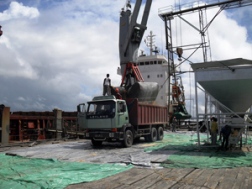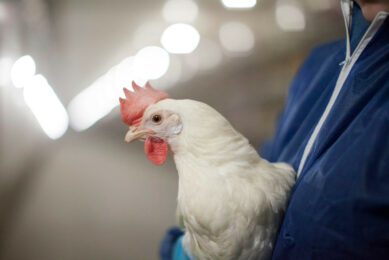After three years Guyanan Didco reopens feed mill

The Didco Trading and Company Limited Feed Mill at Friendship, East Bank Demerara in Guyana, that has been closed since a fire on February 18, 2007, has now reopened its doors.
This opening followed a G$400 million (€1.6m) loan from the Guyana Bank of Trade and Industry (GBTI), said Managing Director, Deo Singh.
Last week a ship from the United States brought 4,300 tonnes of corn and soy meal worth G$300 million (€1.18m), in addition to all the necessary ingredients to formulate high quality feed.
The ingredients are organic and will be sold for poultry, horse, aquaculture, and pigs. The feed will be sold in Georgetown and countrywide in the coming months.
The Managing Director revealed that feed prices will be very competitive and will possess all the necessary electrolytes and vitamins needed in the feed for development in poultry.
“In 35 days, chickens can weigh four pounds. We ensure that farmers can make money that can be passed down to the consumers.”
“Our feed will have all the ingredients it is supposed to have. Weekly analysis of feeds will be done overseas and will be available for inspection by the Ministry and farmers to examine its quality […] There will be no stunted growth.” Deo Singh said.
Singh said that all the workers that initially worked with the feed mill are presently working. He highlighted there is need for skills workers and vacancies exist for electricians, labourers, mechanics, and spray-painters.
Skyrocketing prices
Minister of Agriculture, Robert Persaud, said that he is pleased that the mill is back in operation. Competition is necessary in the market to benefit consumers, he said.
The Minister stated that the Ministry has received reports of skyrocketing prices and farmers are claiming that the feed they are purchasing is not of the right quality; situations were induced to import feed which is an untenable position.
“With the expanding livestock sector, feed is very important if there will be competition on the international market, while the livestock market is export looking and competition and quality are important,” he said.
Quality standard
The ministry has established a standard for mills which is being enforced by the Guyana National Bureau of Standards (GNBS) and a mandatory requirement to have all chickens vaccinated.
“Some persons complained that the chickens were not attaining the required weight and had stunted growth because of different ailments that could have been prevented were they vaccinated,” Persaud said.











